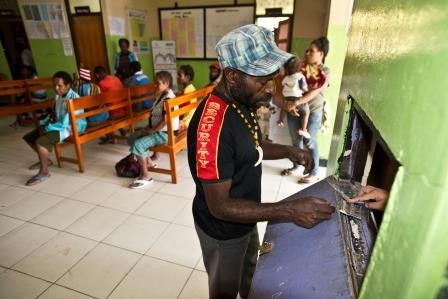
Indonesia has experienced remarkable transformation to a more participatory and more open government over the past two decades. While this young democracy continues to make progress, state institutions still struggle to control endemic corruption, improve management of public services, and protect citizen rights. The United States and Indonesia, two of the largest democratic countries in the world, agreed to elevate its relationship to a Strategic Partnership in 2015 to advance strong and resilient democratic societies while promoting international peace, prosperity and security.
On behalf of the American people, the U.S. Agency for International Development (USAID) partners with the people and Government of Indonesia (GOI) to end extreme poverty and strengthen democratic governance. USAID supports Indonesia’s efforts to advance an inclusive, just, and accountable democracy that protects all citizens’ rights, roots out corruption, and engages with an active civil society and media. Through South-South and Triangular Cooperation, USAID partners with the GOI to provide development assistance to other countries. USAID has a special focus in Eastern Indonesia, including the provinces of Papua, West Papua, Maluku and North Maluku, where some of the country’s poorest and most vulnerable people live.
- All Indonesian district courts now use new USAID-funded electronic case-tracking technology to improve records management and transparency.
- In 2015, USAID helped the Corruption Eradication Commission reach nearly 9 million Indonesians with anti-corruption messages.
- USAID-supported training introduced the latest qualitative approaches to the work of the Audit Board of Indonesia.
Current Programs
Strengthening the Culture of Accountability
As a founding member of the Open Government Partnership, Indonesia declared that openness is a necessity for a modern government and is the key to unlocking the nation’s potential for public service improvement and economic growth. Government that is effective, transparent in process and accountable to its citizens is a key GOI priority. USAID partners with a wide range of GOI accountability institutions to sustain and deepen reform efforts and produce more transparent and higher performing anti-corruption bodies responsive to citizens’ needs. USAID programs engage universities, civil society organizations (CSOs), and think tanks in devising anti-corruption strategies. With our partners, USAID works to strengthen the capacity, performance and public outreach of principal Indonesian accountability institutions, and improve public access to budget information. USAID also works with its partners to enhance accountability within the health, education, and environment sectors to develop systems that reduce opportunities for corruption.
Promoting Protection of Citizen Rights
Indonesia continues to face challenges in ensuring the impartial and effective protection of rights and equal access to justice for its citizens. USAID works with relevant GOI agencies and reputable CSOs, including legal aid organizations and university partners, to improve access to justice, strengthen the capacity of citizens to advocate for their rights, and safeguard human rights for target groups (religious and ethnic minorities, indigenous populations, women, children, the poor, marginalized individuals, and groups vulnerable to discrimination and violence) in prioritized provinces.
Fostering South-South and Triangular Cooperation (SSTC)
The demand for Indonesian development assistance has grown over the past decade and, along with it, the need for the GOI to respond effectively and strategically. USAID provides SSTC support to the Indonesian National Coordination Team (NCT) as it develops institutional frameworks on SSTC and establishes priority areas for Indonesia’s development cooperation. Based on SSTC guiding principles -- partnership, demand-driven assistance and co-investment -- USAID works with the NCT to support capacity building, learning and knowledge management for assistance delivery, and triangular pilot programming to better manage disaster risks, reduce gender-based violence, and improve governance in targeted countries that are a priority for Indonesia.
Preventing Gender-based Violence in Eastern Indonesia
USAID works with local governments and civil society groups to improve their ability to protect vulnerable citizens, focusing activities in Eastern Indonesia, where gender-based violence (GBV) rates are significantly higher than in the rest of the country. USAID helps its partners reduce GBV rates by reducing acceptance of GBV and gender inequality in target communities, while supporting efforts to respond appropriately to GBV victims and perpetrators. Program activities focus on empowering women and men to be agents of social change, helping them to change attitudes, perceptions, and behavior, as well as assisting government in service delivery to those affected by GBV.








Comment
Make a general inquiry or suggest an improvement.